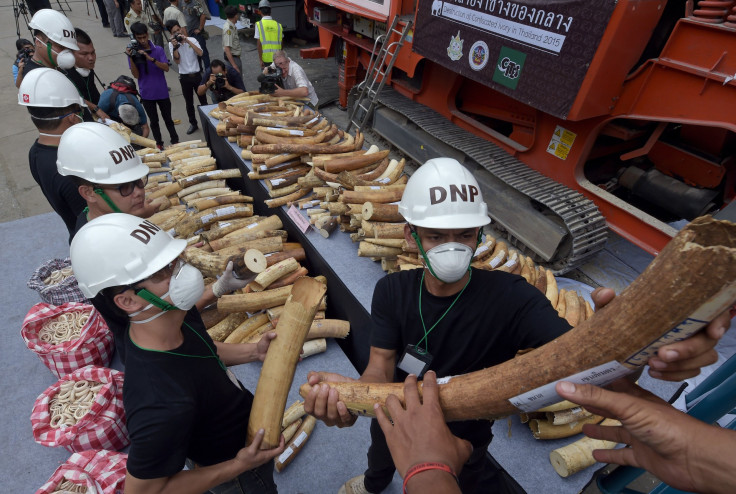Thailand Destroys Confiscated Ivory Stockpile, Reiterates 'Strong Determination' To Clamp Down On Smuggling

The Thai government Wednesday destroyed more than two tons of confiscated ivory worth nearly $3 million in a ceremony heralded as a milestone by animal rights groups. The ceremony was attended by Prime Minister Prayuth Chan-ocha.
“Elephants are our national symbol and are under threat from poaching and trade,” he reportedly said, during the ceremony. “This is to show the Thai government’s strong determination to oppose ivory trafficking and that Thailand will comply with international rules.”
According to the World Wide Fund for Nature (WWF), nearly 30,000 African elephants are poached every year for their tusks. Thailand's ivory market is believed to be the largest unregulated market in the world, with the trade fuelled by ivory from poached African elephants' tusks that are smuggled into the country.
This is the first time the Asian nation -- which was, in 2013, threatened with trade sanctions if it failed to curb ivory smuggling -- has taken steps to destroy part of its ivory stockpile.
“The destruction of this ivory will send a strong, clear message that Thailand will have zero tolerance for consumers of illegal ivory and the traffickers who have long used Thailand as a gateway and marketplace,” Janpai Ongsiriwittaya, a WWF environmentalist, said, in a statement released following last week’s audit of the confiscated ivory. “Thailand’s support of the independent audit process before the ivory crush is a vital step in demonstrating its overall commitment to tackling the issue of illegal ivory in the country and stopping wildlife crime.”
The destruction of raw tusks and carved trinkets comes just months after Thailand passed new legislation to regulate and control the possession and trade of ivory. Under the law, possession of African ivory for sale in the country is prohibited. And, under a newly-drafted National Ivory Action Plan, all ivory obtained from domesticated, privately-owned Asian elephants needs to be registered with Thai authorities.
In April, Thai police seized seven tons of ivory during a series of high-profile raids, after the country’s generals, who seized power in a coup last year, vowed to crack down on illegal trade.
“Considerable progress has been made this year but there will be challenges ahead with implementing regulations, clamping down on illegal traders and reducing demand,” Ongsiriwittaya added, in the statement.
© Copyright IBTimes 2024. All rights reserved.






















